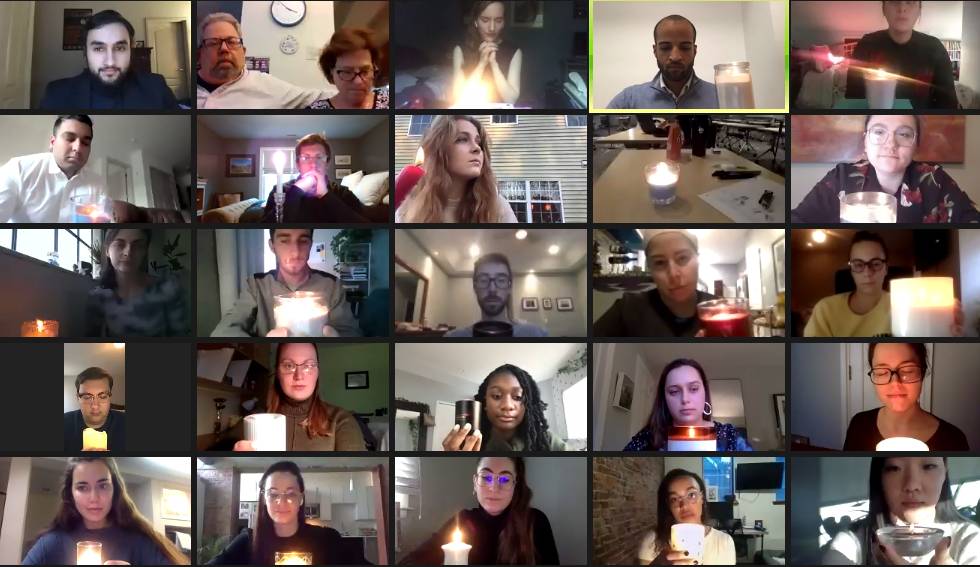
“I feel unqualified to be doing this,” read Erin Russell from her essay, “Thoughts Before the First Cut.” “If I don’t like this maybe I won’t like medicine.”
Russell was one of several students who read from essays and poems reflecting on their experiences in the gross anatomy lab during the Lewis Katz School of Medicine’s (LKSOM) annual Anatomy Donor Celebration on November 20.
Hundreds have gathered for the event in years past. Because of the pandemic, it was moved to Zoom this year, where it drew an audience of about 200, including faculty, students, and family members of some of the donors.
The emotional celebration honored the donors who gave the selfless gift of their bodies after death so that students can learn about the structure of the human body—the underpinning of medicine. For medical and physician assistant students, gross anatomy is among their first steps in the field of medicine.
“Your family members are our first patients,” said co-host Jessica DePaul, a first-year physician assistant student and a member of the celebration’s organizing committee. “There are not enough words to say thank you—thank you for the opportunity to connect to something far greater than us.”
“It was about a half-century ago that I first was able to take anatomy at Temple’s medical school. I remember those days like they were yesterday,” said John M. Daly, MD, FACS, LKSOM Interim Dean and Dean Emeritus. “I was scared. Seeing a cadaver for the first time, it was an awesome moment. It filled me with respect and gratitude. Still, there was a great deal of anxiety for me during that period of time. It diminished greatly, and anatomy became the Bible upon which I learned everything else in medicine.”
Many of the students’ reflections described a similar internal struggle.
“When we first meet, will my response be too human or not human enough?” read Casey Lim from her poem, “When We First Meet.” “Your hands frozen and locked, forever holding onto the hand that had to let go of you. The more I see myself, our size and stature so similar. There is discovery, realization of parts and what is missing.”
“What was in front of me did not appear human,” read Caroline Westwood from her essay, “Deconstructing a Masterpiece. “There was no blood, no yelling in pain, no human responses at all. With each cut, the unease slowly faded. Gratitude took its place.”
“I don’t remember my first incision into your body. My first act on a person has drifted from my mind,” read Kimberlyn McClendon from her essay, “Honoring You.” “I feared ruining your gift by making a mistake. But the beginning hours of anatomy were somehow comforting. Knowing that you gave yourself to our cause was reassuring.”
The assignment to write the essays was given by Douglas Reifler, MD, Associate Dean for Student Affairs and Medical Humanities, who also oversees the Anatomy Donor Celebration with the student organizing committee and Steven Popoff, PhD, the John Franklin Huber Chair of Anatomy and Cell Biology and Director of Fundamentals of Clinical Anatomy and Imaging.
“What your reflections have shown is your humanity, your goodness,” said Michael Vitez, Director of Narrative Medicine at LKSOM. “Anatomy was a journey for you, where you found a balance between being too cold and too connected.”
Some of the students took another tack to get there, crafting fictional autobiographies for their donors.
“I was born in 1919 in Philadelphia, where I lived my entire life. I lived to see a Black president, which I never expected. My mother’s mother was born a slave,” read Steuart Wright from his story, “Born in 1919.” “The doctor says the circulation in my legs is getting worse. If it’s my time, it’s my time. I’ve lived a long, hard life, and I’m ready to rest.”
Midway through the celebration, co-host Sami Pathak, a first-year medical student and co-chair of the celebration’s organizing committee, asked the Zoom audience to turn off its cameras. One by one, a representative from each of the 36 dissection tables in this year’s gross anatomy lab restored their video. They thanked their donor by name and lit a candle in their memory.
Following the candle-lighting, DePaul asked if any of the family members in attendance wanted to say anything. Suzzette Moore was the first to speak.
“My father was adamant about donating his body,” she said. “He had lung reduction surgery at Temple that prolonged his life, and he wanted our future doctors to be able to learn from him.”
A few others followed Moore, each expressing their simple gratitude to the students for seeing their loved one as a person and for finding new meaning in their existence.
